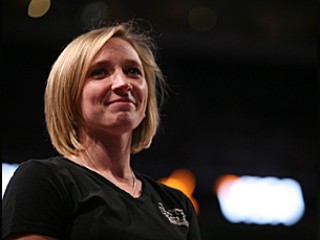
Kim Zmeskal biography
Date of birth : 1976-02-06
Date of death : -
Birthplace : Houston, Texas, U.S.
Nationality : American
Category : Sports
Last modified : 2010-06-18
Credited as : Gymnast, won U.S. championships three times,
0 votes so far
Her coach called her the "little pumpkin," but there was nothing small about Kim Zmeskal's achievements. Zmeskal did something extraordinary, and all-too-rare for American women: she captured a gold medal in the 1991 world championships all-around competition. The following year, on the eve of the Olympics, she earned individual gold medals in floor exercise and balance beam, beating a well-trained and highly competitive international field. Outgoing and hard-working, Zmeskal has drawn comparisons with Mary Lou Retton because her build is so muscular. Together with teammate Shannon Miller, she has helped bring a new level of respect to the American women's gymnastics team.
Zmeskal was one of the rare and lucky gymnasts who could train without leaving her hometown. Born and raised near Houston, she began tumbling at age six when she followed a friend into the Sundance Athletic Club. The club had recently been bought by gymnastics coach Bela Karolyi, the force behind such legends as Nadia Comaneci and Mary Lou Retton. When Zmeskal became serious about the sport, she found she could spend long hours at the club without sacrificing the normalcy of her home life. That proved to be a big plus for her career.
As a seventh grader, Zmeskal was chosen to be one of "Karolyi's Kids," an honor reserved for a half dozen elite gymnasts being groomed for world competition. Zmeskal, who had never been tagged as a prodigy, was thrilled. She left school and continued her studies through correspondence, while spending as many as eight hours a day training with Karolyi. "All I've missed of my childhood is leaving school," she told Sports Illustrated in 1992. "I don't count that as too much of a sacrifice. I can still go back. I've had a pretty good life, knock wood."
Karolyi began to detect the seeds of greatness in the athlete he called "little pumpkin." Sure enough, in the autumn of 1991, the four-foot-seven, 80-pound Zmeskal made history when she won the first gold medal in the gymnastics all-around at the world championships held in Indianapolis. Zmeskal also helped the Americans win a team silver medal by turning in a perfect 10 vault late in the team competition. After the event, Karolyi told Time: "Kim has an outstanding capability to pull herself together and perform consistently under pressure. You can see on her face that she'll do it, no matter what."
Zmeskal's gold medal performance drew sneers from at least one of her competitors, Svetlana Boguinskaia of the former Soviet Union. Boguinskaia suggested that Zmeskal had only won because she was on her home turf. As if to prove her Soviet counterpart wrong, Zmeskal traveled to Paris in the spring of 1992 and captured two gold medals in individual events, floor exercise and balance beam. The stage was set for a showdown between Zmeskal, the three-time U.S. champion, and Boguinskaia at the 1992 Summer Games.
Both Zmeskal and her coach thought the 1992 Olympics would be Kim's chance to shine. She was known for her mental toughness and admired for her healthy-looking, muscular physique. No American had beaten her in years, and she had won the most recent world championship. Boguinskaia, her most serious challenger, was 19, a veritable senior citizen in the gymnastics ranks.
Curiously enough, the Olympics proved Zmeskal's downfall. While teammate Shannon Miller won two silver and two bronze medals, Zmeskal came up nearly empty-handed, earning only a bronze in team competition. In her best event, the balance beam, she fell off during a cartwheel back handspring. She had never missed the move before, even in practice.
"I'd always imagined the Olympics would be the best meet of my whole life. And it wasn't," Zmeskal said in Sports Illustrated. ". . . I was worried I'd let everybody down. Bela. The team. The American people. How could I not? The television camera was right in my face." On the other hand, Zmeskal concluded that she was glad to have won a team bronze. "The bronze medal was so cool," she said. "That was the best night of the whole year. It was my best performance."
Shortly after the 1992 Olympics, Zmeskal decided to reduce her training time and enjoy the life of a normal high school junior. She soon discovered that she really hadn't missed much, spending all those hours in the gym. "After two weeks it was already boring," she told Sports Illustrated. "I used to dream of the day when I could just flop on the living room couch after school and watch television from 5 to 9 p.m. But now that I can do it, I'm not interested."
The path led back to Karolyi's gym, and Zmeskal is still there, still competing on the national level, and helping to groom the next generation of Olympians. From her own experiences, she told Sports Illustrated, "I've learned you don't have to win first place to win. People have been so supportive. It's almost like they feel it's good that someone doesn't always win. This hasn't been bad for me at all, not winning [an Olympic] gold medal. It's almost better."
Career
Captured a gold medal in the world championships all-around competition, and helped the Americans win a team silver medal by turning in a perfect-10 vault, 1991; earned individual gold medals in floor exercise and balance beam, world championships, 1992; won U.S. championships three times; earned a bronze medal in team competition, 1992 Olympic Games, Barcelona, Spain.
















